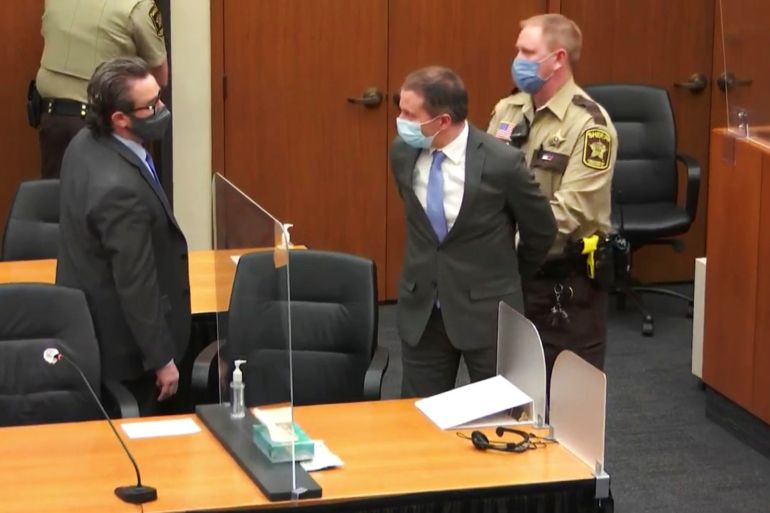Derek Chauvin asks for new trial after Floyd murder conviction
Ex-US police officer who knelt on Floyd’s neck for more than nine minutes was found guilty last month of murder and manslaughter.

A lawyer for former Minneapolis police officer Derek Chauvin in the United States has requested a new trial, two weeks after Chauvin was found guilty of second- and third-degree murder and manslaughter in the killing of a Black man, George Floyd.
In a document filed to District Court Judge Peter Cahill on Tuesday, Eric Nelson said the ex-officer was deprived of a fair trial, citing alleged prosecutorial and jury misconduct, errors of law at the trial and that the verdict was contrary to law.
Keep reading
list of 3 itemsDerek Chauvin found guilty of murdering George Floyd
‘Hail Mary time’ for Derek Chauvin’s defence: Legal experts
“The publicity here was so pervasive and so prejudicial before and during this trial that it amounted to a structural defect in the proceedings,” Nelson wrote in the motion, as reported by broadcaster CNN.
Chauvin’s conviction on April 20 after a widely watched trial in Minneapolis, Minnesota, had been welcomed by activists as well as US politicians, who said it was an important step forward in the fight for racial justice in the US.
Floyd’s murder on May 25 last year was captured on camera and led to mass protests across the US and around the world, with thousands taking to the streets to demand an end to police violence against Black people.

Chauvin, who was filmed with his knee on Floyd’s neck for nine minutes and 29 seconds, faces at least 75 years in prison – and potentially more if the judge finds aggravating factors sought by the prosecution. His sentencing has been set for June.
After news broke that Chauvin is seeking a new trial, Floyd family lawyer Ben Crump tweeted: “No. No. No. Guilty. Guilty. Guilty.”
During the trial, Nelson had argued that the jurors could be influenced by the news surrounding the trial, including comments by politicians on what might happen as a result of the verdict.
Judge Cahill had rejected those arguments but asked jurors to avoid watching the news. The jury was sequestered after the closing arguments were made in the case.
In his motion on Tuesday, Nelson alleged the jury committed misconduct, felt pressured, and/or failed to adhere to jury instructions, although the filing did not include further details about those claims.
The brief did not mention recent reports that one of the jurors participated in an August 28 march in Washington, DC, to honour Martin Luther King Jr. That juror has defended his actions, saying the event was not a protest over Floyd’s death.
Mary Moriarty, a former chief public defender in Minneapolis who now teaches at the University of Minnesota Law School, noted the grounds were vague and the defence had asked for more time to develop their points on alleged juror misconduct.
“This is a standard motion that defence lawyers would typically make after a conviction in a trial,” she said.
Al Jazeera’s Mike Hanna, reporting from Washington, DC, said Chauvin’s lawyer is contending that there were multiple problems with the trial, including that the judge refused to move the venue from Minneapolis.
“Now it’s up to the Minneapolis District Court to decide whether or not to proceed with this complaint, or to investigate it further,” he reported.
Hanna added that an appeal was not unexpected, but said: “This is such a high-profile case that inflamed so many emotions, that any attempt to try and knock down this verdict is going to be met with deep public concern.”
No. No. No. Guilty. Guilty. Guilty. https://t.co/tC95w0ITUc
— Ben Crump (@AttorneyCrump) May 4, 2021
Prosecutors last week had asked the judge overseeing the case against Chauvin to consider several aggravating circumstances when he sentences the former police officer.
State of Minnesota Attorney General Keith Ellison and lead prosecutor Matthew Frank said that Chauvin deserves a sentence stiffer than the state guidelines dictate because he held a position of authority and treated Floyd, a vulnerable victim, with cruelty.
The “defendant’s actions inflicted gratuitous pain, and caused psychological distress to Mr. Floyd and to the bystanders”, the prosecutors wrote, adding that Chauvin made “no attempt” to give Floyd medical attention.